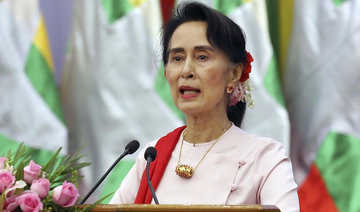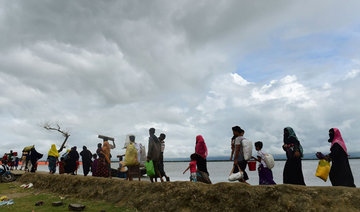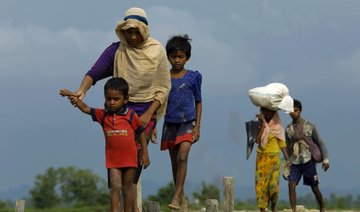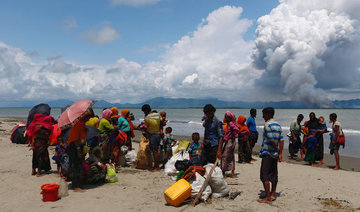UKHIA, BANGLADESH: The lost Rohingya boy made the journey from Myanmar alone, following strangers from other villages across rivers and jungle until they reached Bangladesh, where he had no family and no idea where to go.
“Some women in the group asked, ‘Where are your parents?’ I said I didn’t know where they were,” said Abdul Aziz, a 10-year-old whose name has been changed to protect his identity.
“A woman said, ‘We’ll look after you like our own child, come along’. After that I went with them.”
More than 1,100 Rohingya children fleeing violence in western Myanmar have arrived alone in Bangladesh since August 25, according to the latest UNICEF figures.
These solo children are at risk of sexual abuse, human trafficking and psychological trauma, the UN children’s agency said.
Many have seen family members brutally killed in village massacres in Rakhine state, where the Myanmar army and Buddhist mobs have been accused of crimes described by the UN rights chief as “ethnic cleansing.”
Others narrowly escaped with their own lives — some children arriving in Bangladesh bear shrapnel and bullet wounds.
The number of children who crossed into Bangladesh alone, or were split up from family along the way is expected to climb as more cases are discovered.
More than half of the 370,000 Rohingya Muslims who have made it to Bangladesh since August 25 are minors, according to UN estimates.
A sample of 128,000 new arrivals conducted in early September across five different camps, found 60 percent were children, including 12,000 under one year of age.
This presents a needle in a haystack scenario for child protection officers trying to find unaccompanied minors in sprawling refugee camps, where toddlers roam naked, children sleep outdoors and infants play alone in filthy water.
“This is a big concern. These children need extra support and help being reunited with family members,” Save the Children’s humanitarian expert George Graham said in a statement.
“At first they don’t talk, don’t eat, don’t play. They just sit still, staring a lot,” Moazzem Hossain, a project manager with Bangladeshi charity BRAC told AFP at a ‘child-friendly space’ run in partnership with UNICEF at Kutupalong refugee camp.
There are 41 of these safe zones across Bangladesh’s ever-expanding network of refugee camps.
Every day children, some carrying younger siblings, flock to the simple wooden huts for activities like singing, playing with toys and blocks and skipping ropes.
It is a welcome distraction from the misery outside, where monsoon rain turns the camp into a quagmire and exhausted refugees compete for dwindling food and space.
But playtime also allows staff to register details about a child’s background, monitor newcomers and keep an eye out for the tell-tale signs of a child on their own.
One such youngster was 12-year-old Mohammad Ramiz, who found himself alone after fleeing his village and tagged along with a group of adults.
“There was a lot of violence going on, so I crossed the river with others,” said Ramiz, not his real name.
“I ate leaves from the tree, and drank water to survive.”
There are fears the vulnerable minors could be exploited if left unsupervised in the camps, UNICEF Geneva spokesman Christophe Boulierac told AFP.
Girls are particularly at risk of being lured into child marriages, or trafficked to red-light districts in big cities where they are forced into prostitution and abused, he added.
But the facilities for refugee children are vastly overstretched.
Over just two days, 2,000 children came through a single ‘safe space’ in Kutupalong, little larger than a classroom with just a few staff on hand.
Thirty-five unaccompanied minors were identified over that period, Boulierac said, but more resources were needed to ensure others did not slip through the cracks.
“The faster we act, the more chance we have of finding their family,” he told AFP.
“The most important thing is to protect them because unaccompanied children, separated children, are particularly vulnerable and in danger.”
Hundreds of Rohingya children arrive in Bangladesh alone
Hundreds of Rohingya children arrive in Bangladesh alone
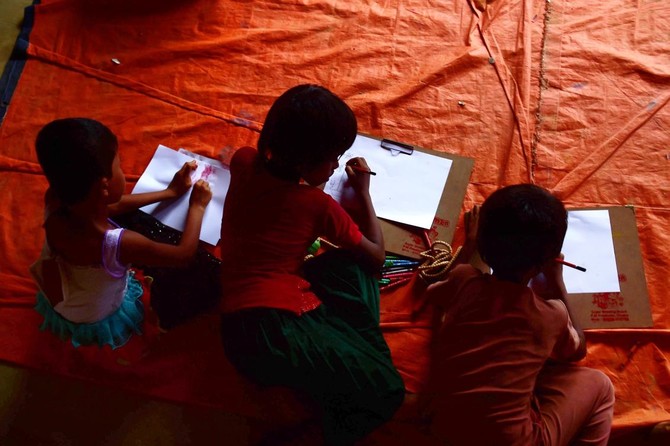
Tensions high in Mozambique as opposition leader due home from exile

- Opposition leader Venancio Mondlane announced last week that he would continue his demand for ‘electoral truth’ after the October vote
- The election dispute has unleashed waves of violence that have left around 300 people dead, including protesters killed in a police crackdown
At one of several barriers erected around the airport, security forces shot and wounded one of hundreds of mostly young people wanting to reach the airport to welcome Mondlane home, an AFP reporter at the scene said.
Mondlane announced last week that he would land at Maputo’s international airport at around 8:00 a.m. (0600 GMT) in a bid to continue his demand for “electoral truth” after the October vote.
He claims that the election was rigged in favor of the candidate of the ruling Frelimo party, Daniel Chapo, who is due to be sworn in on January 15.
The election dispute has unleashed waves of violence that have left around 300 people dead, including protesters killed in a police crackdown, according to a tally by a local rights group.
Authorities say police have also been killed and there has been looting and vandalism.
There are fears that the charismatic Mondlane could be arrested on his return, including on charges related to the weeks of protests by his supporters, many of them young Mozambicans desperate for change after 50 years under Frelimo.
Any government action against Mondlane could send Mozambique — still scarred by years of civil war — into a major crisis, analysts said.
“If the government arrests Venancio, there will be an international outcry and potentially very dangerous demonstrations,” said Eric Morier-Genoud, an African history professor at Queen’s University Belfast.
“If they don’t arrest him, he will occupy the center and Frelimo will be weakened just a few days before the inauguration of the deputies and the president.”
Mondlane’s return gives people hope, said Fatima Pinto, 20, who trained as a general medical technician.
“We young people are here fighting for our tomorrow,” she said, echoing a key complaint among the youth about not being able to find work that matches their qualifications.
Chapo, 48, takes over from President Filipe Nyusi, who bows out at the end of his two-term limit. Official results gave him 65 percent of the vote compared to 24 percent for Mondlane.
But observers said they noted irregularities.
Since he went into hiding after the October 19 assassination of his lawyer, Mondlane has rallied his supporters via social media live addresses that have been joined by thousands.
By returning, Mondlane will “reclaim the political initiative,” Morier-Genoud said, with the population “more militant than ever.”
The unrest has caused major losses to Mozambique’s economy, stopping cross-border trade. Shipping, mining and industry has also been affected while thousands of people are reported to have fled to neighboring countries.
Mondlane’s return “will either destabilize or resolve the current political crisis,” said Tendai Mbanje, analyst at the Johannesburg-based African Center for Governance.
With tensions running high, there are even fears he could be assassinated, as some of his supporters have been, Mbanje said.
“He is the current hope and future of the youths: if his life is at risk or tampered with, that will be a source of unending instability,” he said.
“On the other hand, if Frelimo would like to unite the country, it is time that they take his return as an opportunity for dialogue.”
Any attempt to harm Mondlane would unleash a “big demonstration with unpredictable consequences,” said Mozambican sociologist Joao Feijo.
“We are talking about a population that has already tasted disobedience and is not afraid of anything else,” he said.
Tailor Americo Bulule, 52, said he hoped that the security forces would allow people to go to the airport to welcome Venancio.
“There’s already been a lot of bloodshed so I’d like his arrival not to be a problem and the police to give the population access and we can go there to receive him without weapons and tear gas,” he said.
Philippine Catholic devotees mass in Manila hoping for a miracle

- Day-long procession of centuries-old statue of Jesus Christ in an annual display of religious fervor
- Parade commemorates arrival of the genuflecting Jesus the Nazarene from Acapulco, Mexico in the early 1600s
MANILA: Hundreds of thousands of Catholic pilgrims swarmed the streets of Manila in search of a miracle Thursday, straining to reach a centuries-old statue of Jesus Christ in an annual display of religious fervor.
The procession to the Philippine capital’s Quiapo Church, which started before dawn after an open-air mass, was expected to swell to more than two million participants from across the heavily Catholic country, church officials said.
Barefoot men and women in maroon shirts – the color of the robe that covers the black, wooden Jesus the Nazarene statue – scrambled to grab the rope used to draw the life-sized religious icon, believing it would bring good health.
“I prayed that my mother be healed from her heart attack,” Dong Lapira, 54, said of a previous procession where he had been bruised and jostled in his attempt to join those pulling the rope.
But he vowed to try again Thursday – this time to see his wife healed of gallstones.
“The Nazarene is very sacred. It has granted many prayers,” he added.
Some faithful frantically threw white towels to worshippers tasked with guarding the float, hoping God’s blessings might rub off on the cloth as they’re used to clean the statue’s glass case.
One of the volunteer guards, Alvin Olicia, 38, said he was unaffected by the “extreme heat or rain” he has confronted at past processions.
“I don’t feel it at all. I like my task, because through catching other’s handkerchiefs, I feel like I am connecting them to their faith and to the Nazarene.”
While authorities have banned devotees from climbing on the carriage, some still clambered over other attendees, risking life and limb to be near the religious icon.
Ester Espiritu, 76, who traveled 35 kilometers from her home in Cavite province, said just catching a glimpse of the statue would be enough.
“Even If I’m struggling to come here because of my age... I feel happy and well whenever I see the Nazarene,” said Espiritu, who added she was praying for a lingering shoulder injury.
The giant religious parade commemorates the arrival of the wooden statue of the genuflecting Jesus the Nazarene from Acapulco, Mexico in the early 1600s, shortly after the start of the Spanish colonial conquest.
Its color – which has led it to be popularly known as the Black Nazarene – was believed to have been caused by a fire aboard the Spanish galleon that was transporting it.
President Ferdinand Marcos said the annual celebration of the icon was a “testament to our people’s solidarity and camaraderie.”
“It also speaks of the immense power and compassion of God who walks with us and hears our prayers, especially in our time of need,” Marcos said in a statement.
Police said about 14,500 security personnel had been deployed along the procession’s six-kilometer route as a precaution.
Mobile phone signals were also blocked to prevent the remote detonation of explosive devices during the parade which is expected to last up to 18 hours, police said.
Emergency response teams were stationed along the route.
The Red Cross said it provided first aid treatment to more than 100 participants in the first few hours of the procession, mainly for cuts, dizziness, nausea and body weakness.
Taliban say India is a “significant regional partner” after meeting

- India’s foreign ministry said after the Delhi meeting that India was considering engaging in development projects in Afghanistan and looking to boost trade ties
KABUL:The Taliban’s foreign office said they saw India as a “significant regional and economic partner” after meeting with its most senior foreign ministry official, the highest level talks with Delhi since their takeover of Afghanistan in 2021.
India’s Foreign Secretary Vikram Misri met acting Taliban Foreign Minister Amir Khan Muttaqi in Dubai on Wednesday.
Afghanistan’s foreign ministry said in a statement that they had discussed expanding relations with Afghanistan and to boost trade through Chabahar Port in Iran, which India has been developing for goods to bypass the ports of Karachi and Gwadar in its rival Pakistan.
“In line with Afghanistan’s balanced and economy-focused foreign policy, the Islamic Emirate aims to strengthen political and economic ties with India as a significant regional and economic partner,” the statement from Afghanistan’s foreign ministry said late on Wednesday.
India’s foreign ministry said after the Delhi meeting that India was considering engaging in development projects in Afghanistan and looking to boost trade ties.
No foreign government, including India, officially recognizes the Taliban administration.
However, India is one of several countries with a small mission in Kabul to facilitate trade, aid and medical support and has sent humanitarian aid to Afghanistan under the Taliban.
Regional players including China and Russia have signalled they are willing to boost trade and investment in Afghanistan.
The Delhi meeting could ruffle Pakistan, which borders both countries and has fought three wars in the past against India.
Pakistan and Afghanistan also have a strained relationship, with Pakistan saying that several militant attacks that have occurred in its country have been launched from Afghan soil — a charge the Afghan Taliban denies.
Earlier this week India’s foreign office told journalists they condemned airstrikes conducted late last year by Pakistan on Afghan soil.
South Korea’s Yoon Suk Yeol to accept court decision even if it ends presidency, lawyer says

- Yoon has earlier defied the court’s requests to submit legal briefs before the court began its hearing on Dec. 27
- Presidential security guards resisted an initial effort to arrest Yoon last week though he faces another attempt
SEOUL: South Korean President Yoon Suk Yeol will accept the decision of the Constitutional Court that is trying parliament’s impeachment case against him, even if it decides to remove the suspended leader from office, his lawyer said on Thursday.
“So if the decision is ‘removal’, it cannot but be accepted,” Yoon Kab-keun, the lawyer for Yoon, told a news conference, when asked if Yoon would accept whatever the outcome of trial was
Yoon has earlier defied the court’s requests to submit legal briefs before the court began its hearing on Dec. 27, but his lawyers have said he was willing to appear in person to argue his case.
The suspended president has defied repeated summons in a separate criminal investigation into allegations he masterminded insurrection with his Dec. 3 martial law bid.
Yoon, the lawyer, said the president is currently at his official residence and appeared healthy, amid speculation over the suspended leader’s whereabouts.
Presidential security guards resisted an initial effort to arrest Yoon last week though he faces another attempt after a top investigator vowed to do whatever it takes to break a security blockade and take in the embattled leader.
Seok Dong-hyeon, another lawyer advising Yoon, said Yoon viewed the attempts to arrest him as politically motivated and aimed at humiliating him by bringing him out in public wearing handcuffs.
India stampede: Six dead as thousands gather for free pass to visit Hindu temple

- People started queuing from as early as Wednesday for tokens to visit an almost 2,000-year-old temple
HYDERABAD: At least six people were killed and several others injured late on Wednesday in a stampede in southern India after thousands of devotees queued outside one of the most visited Hindu temples to collect tokens for a free visit to the deity.
Authorities had set up counters at a school to issue tokens from Thursday for devotees to visit The Sri Venkateswara Swamy Temple, popularly known as the Tirupati, in Andhra Pradesh state during Jan. 10-19, a period considered auspicious by the locals, the Indian Express reported.
People started queuing from as early as Wednesday for the tokens to visit the almost 2,000-year-old temple and pushed and jostled leading to the stampede, according to the office of the chief minister of the state.
“Pained by the stampede in Tirupati, Andhra Pradesh. My thoughts are with those who have lost their near and dear ones,” India Prime Minister Narendra Modi said on X.


